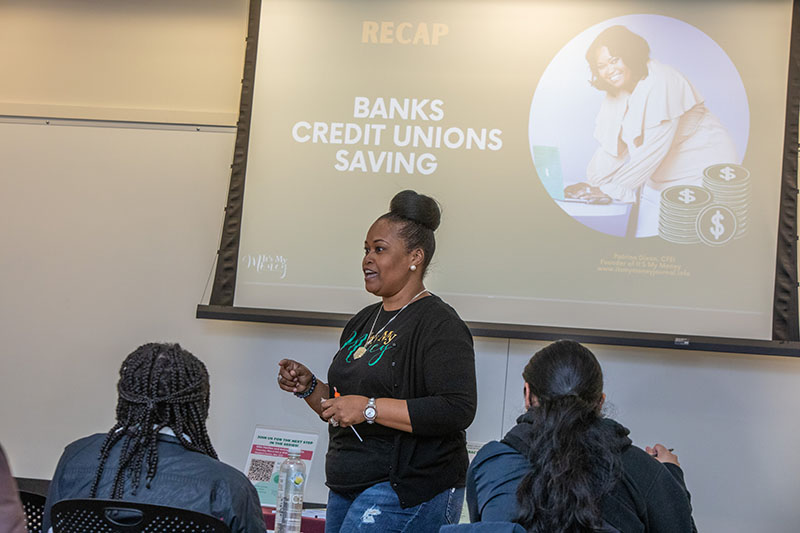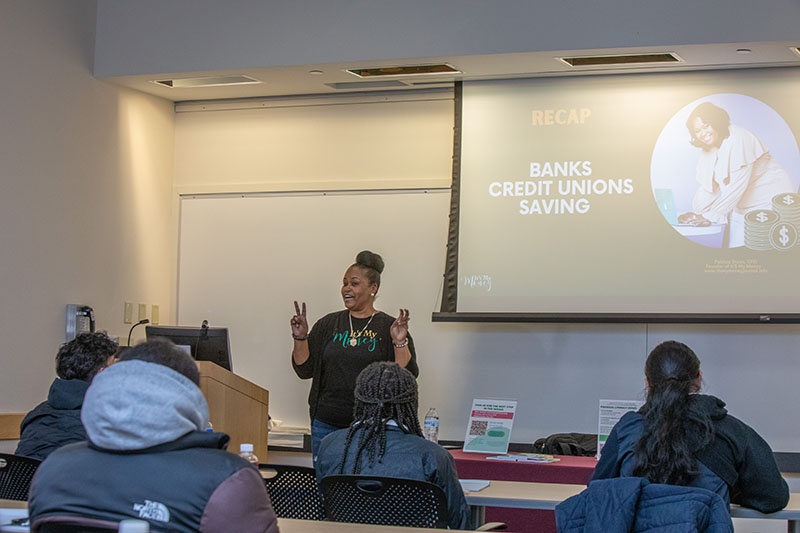- Apply
- Visit
- Request Info
- Give
Series educates students on personal finance
Written by Jack Jones
Published on March 08, 2023
Students heard advice on credit card debt and credit scores at a financial workshop on March 2, one of a series of ongoing talks this semester designed to prepare them for the tribulations of a postgraduate lifestyle. The series is sponsored by the Unity Wing and Offices of Career Success and Opportunity Programs.
Personal financial expert Patrina Dixon, an international speaker and a best-selling author, hosted a series of Financial Literacy lectures from Feb. 23 to March 9. At the March 2 session, Dixon informed a group of approximately 15-20 students about the intricacies of credit scores and reports.
“I began thinking recently about how I can get started with a credit card and what not, so this was a perfect opportunity,” Zachary Robinson, first-year political science major, said. “After attending, I got some great ideas on how to start moving forward, so now I’m just excited to learn more at Patrina’s next lecture.”
During the seminar, Dixon reiterated the most important information from her previous lecture on Feb. 23, “How to Budget.” She urged students to practice delayed gratification — waiting until you can afford expensive items on the market — to begin saving money in a savings account to earn interest and to create prioritized budgeting plans.
“I really want to get my feet on the ground, in terms of budgeting and applying for credit cards,” senior Jannine Ramirez said. “I don’t really have too much knowledge on that, especially because we were taught the bare minimum in high school.”
Dixon’s seminar on March 2 focused on teaching students about the multifaceted and often complex nature of credit. She began by defining credit while simultaneously outlining the distinctions between revolving and installment credit.
Much like Ramirez, Dixon emphatically stated that high schools should establish financial literacy courses as requirements of their curriculum. She said that surprisingly, only 15-17 states across America implement financial literacy courses as a requirement for graduation.
Her financial expertise allowed students to gain insights into the inner workings of credit reports, the three primary credit bureaus — Experian, TransUnion and Equifax — and the ways in which FICO and Vantage, two credit reporting agencies, assess credit scores.
She also taught students how to access their credit reports free of cost by using annualcreditreport.com. Through this site, students can also file disputes if they recognize any errors on their personal reports.
However, the most important aspect of this lecture was centered around teaching students how to increase their credit scores to the desirable range of 780-850. In essence, the two biggest factors that influence an individual’s credit scores are the credit card owners’ payment history and the amount of accumulated interest they owe to the bank.
Some of the paramount advice she delivered included paying bills in their entirety, paying debt as efficiently as possible and attempting to utilize/own only one credit card.
Finally, she urged first-time credit card owners to purchase only what they consider to be necessities, such as groceries and gas. She said that Discover, Capital One, Chase, City and American Express cards are reliable for first-time credit card owners.
“I really enjoyed it, because I learned a lot about how to get started with my first credit card,” Ramirez said.




